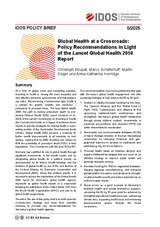Policy Brief
Global health at a crossroads: policy recommendations in light of the Lancet Global Health 2050 Report
Strupat, Christoph / Marco Schäferhoff / Martin Siegel / Anna-Katharina HornidgePolicy Brief (5/2025)
Bonn: German Institute of Development and Sustainability (IDOS)
DOI: https://doi.org/10.23661/ipb5.2025
At a time of global crisis and competing priorities, investing in health is among the most impactful and cost-effective decisions governments and stakeholders can make. Beyond being a fundamental right, health is a catalyst for growth, stability and resilience – particularly in uncertain times. The new Global Health 2050: the path to halving premature death by mid-century (Global Health 2050) report (Jamison et al., 2024) of the Lancet Commission on Investing in Health (the Commission) builds on a legacy of evidence-driven reports to provide strategies for making health a cross-cutting enabler of the Sustainable Development Goals (SDGs). Global Health 2050 provides a roadmap for further health improvements in all countries by mid-century, arguing that by 2050 countries can reduce by 50% the probability of premature death (PPD) in their populations. The Commission calls this goal “50 by 50”. Germany has solidified its role in global health through significant investments in the health sector and by designating global health as a political priority, as demonstrated by its Global Health Strategy and the inclusion of global health as one of the core themes of the Federal Ministry for Economic Cooperation and Development (BMZ). Given this political priority, it is essential to assess the implications of the Global Health 2050 report for Germany’s global health agenda, especially as global health stands at a crossroads following the withdrawal of the United States (US) from the World Health Organization (WHO) and cuts to its global health programmes. Therefore, the aim of this policy brief is to build upon the Commission’s findings and draw from scientific evidence to provide key recommendations for Germany’s global health agenda. Five recommendations have been synthesised that align with Germany’s global health engagement and offer promising strategies to help achieve the 50 by 50 goal:
1. Sustain or ideally increase funding for the Gavi, The Vaccine Alliance, and the Global Fund to Fight AIDS, Tuberculosis and Malaria at the upcoming replenishment conferences and strengthen Germany’s global health leadership through strong bilateral support, investments in pandemic preparedness and response (PPR) and better interministerial coordination.
2. Reconsider non-communicable diseases (NCDs) in future strategic direction of German international cooperation by reducing financial and geo-graphical barriers to access to medicines and addressing key NCD risk factors.
3. Promote health taxes on tobacco, alcohol, and sugar-sweetened beverages that can serve as an effective strategy to improve public health and generate domestic revenue.
4. Increase funding for R&D in neglected diseases. Expand regional manufacturing, and enhance global health innovation coordination to strength-en global health security and reduce dependence on external supply chains.
5. Nepal serves as a good example of Germany’s bilateral health and social protection support: advancing the 50 by 50 goal could be achieved by strengthening national health insurance, addressing climate risks, expanding health taxes and enhancing pharmaceutical access through the Arrow mechanism.
Marco Schäferhoff, PhD, is co-founder and Managing Director of Open Consultants, Berlin. He has over 20 years of experience in global health financing and policy.
Professor Dr Martin Siegel is Junior Professor for Empirical Health Economics at the TU Berlin since March 2018. He is currently involved in research partnerships with Bangladesh, Ghana, India and Uganda, where he contributes his expertise in health economics, statistics, econometrics and impact evaluations.
Kontakt
Cornelia Hornschild
Koordinatorin Publikationen
E-Mail Cornelia.Hornschild@idos-research.de
Telefon +49 (0)228 94927-135
Fax +49 (0)228 94927-130
Alexandra Fante
Bibliothekarin/Open Access-Koordinatorin
E-Mail Alexandra.Fante@idos-research.de
Telefon +49 (0)228 94927-321
Fax +49 (0)228 94927-130





